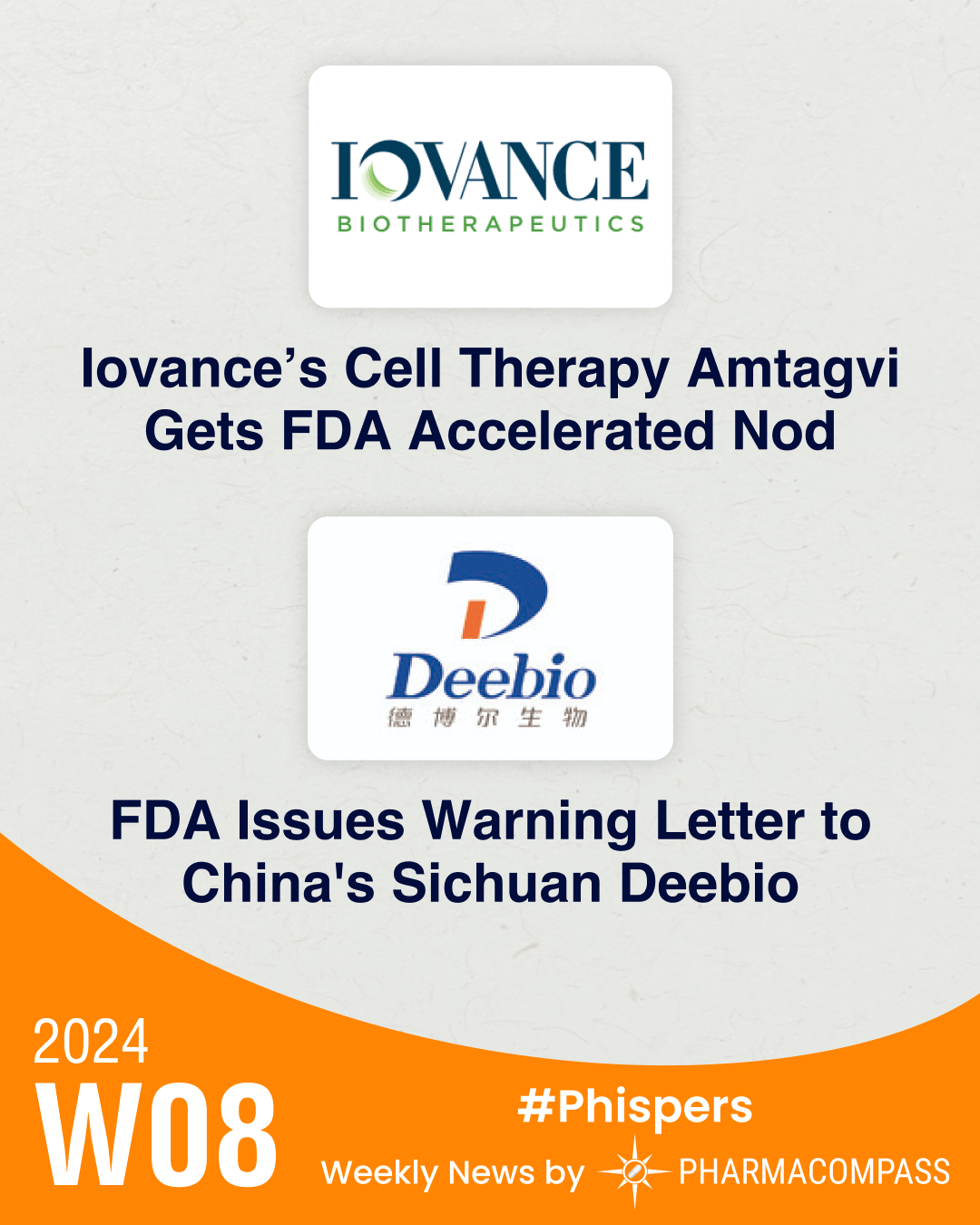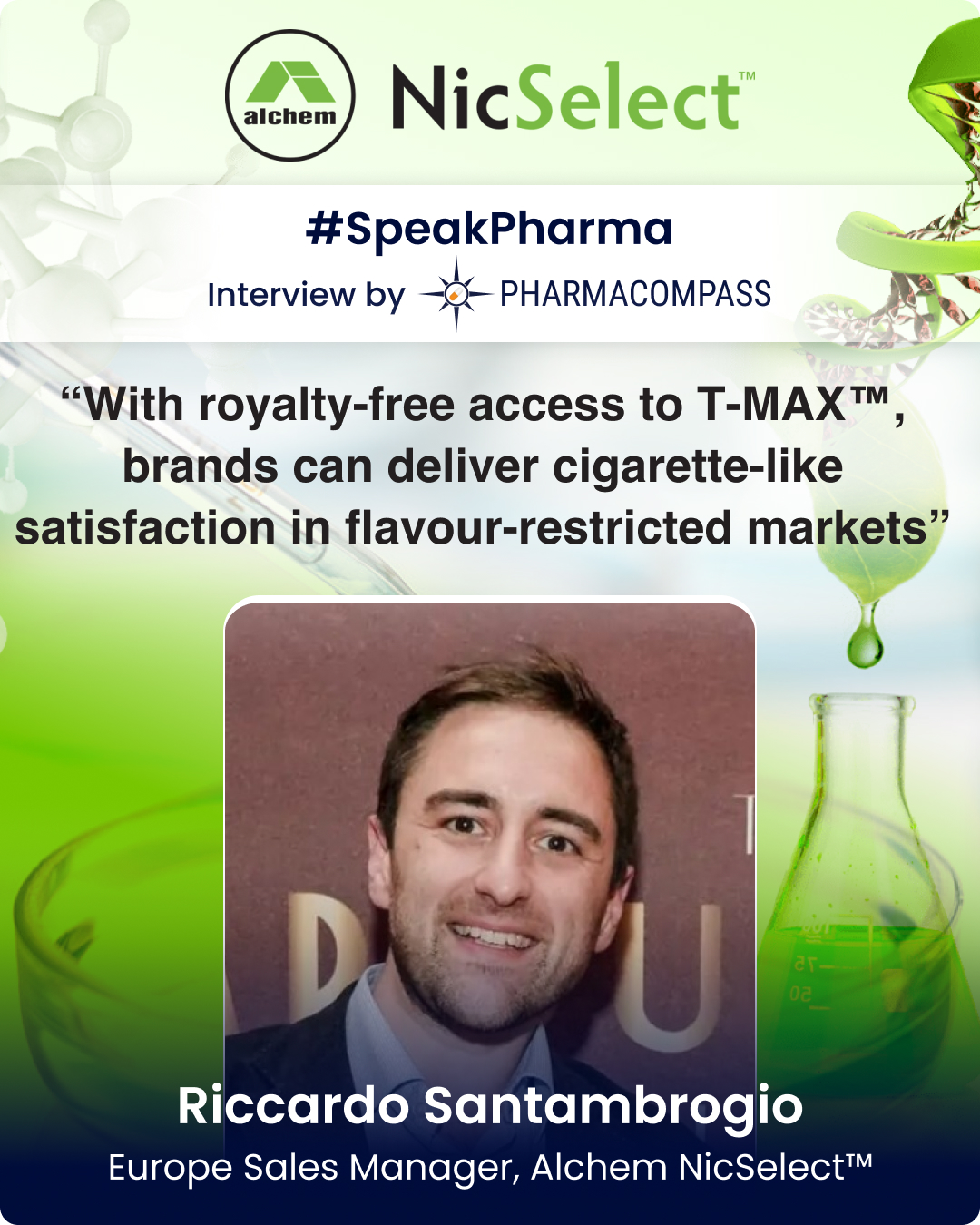
By PharmaCompass
2024-02-22
Impressions: 1,118
The United States Food and Drug Administration (FDA) has granted accelerated approval to Iovance’s cell therapy — Amtagvi (lifileucel) — for treating adult patients with unresectable or metastatic melanoma (a kind of skin cancer). The agency also expanded the label of Roche and Novartis’ Xolair to help people with food allergies avoid severe reactions following accidental exposure.
Following a priority review, FDA approved AstraZeneca’s blockbuster cancer therapy Tagrisso (to be used in combination with chemotherapy) for treating adults with a type of advanced lung cancer.
In regulatory news, Chinese API maker Sichuan Deebio was hit with an FDA warning letter after it failed to ensure data integrity and significantly deviated from current good manufacturing practices (cGMPs).
When it comes to managing HIV, developing long-acting treatments has become a major focus for drugmakers. In a late-stage trial, GSK’s long-acting injection for HIV, Cabenuva, worked better than daily pills for patients with a challenging history of adherence.
Iovance’s groundbreaking T-cell therapy scores FDA’s accelerated approval
FDA has granted accelerated approval to Iovance Biotherapeutics’ cell therapy Amtagvi (lifileucel) for treating the deadliest form of skin cancer. Amtagvi is the first and the only one-time, individualized T cell therapy to receive FDA approval for a solid tumor cancer. It has been greenlit for adult patients with advanced melanoma whose cancer has spread to other parts and is beyond surgery. As part of the therapy, the patient’s own T cells (white blood cells that fight disease) are deployed with tumor-infiltrating lymphocytes (TIL).
Amtagvi will come with a boxed warning, the highest safety warnings, for treatment-related mortality. Iovance doesn't see the serious warning impacting sales of Amtagvi, and hopes to start reporting noteworthy revenue in the second quarter of 2024. The mid-cap company expects to list the drug in the US at US$ 515,000 per patient.
FDA okays Xolair as first med to prevent severe food allergy reactions
Roche and Novartis’ Xolair (omalizumab) has become the first med approved by the FDA to help people with food allergies avoid severe reactions following accidental exposure. This opens the drug to around 17 million people in the US whose allergies can potentially be deadly. A study sponsored by the National Institutes of Health showed that 68 percent of patients with peanut allergies tolerated half a teaspoon (600 milligrams) of peanut butter compared to around 6 percent in the placebo group. Similar results were seen among participants with milk, egg, tree nuts, and wheat allergies. Xolair is already approved to treat allergy triggered asthma, chronic inflammatory sinus disease with nasal polyps, and chronic hives.
Chinese API maker Sichuan Deebio hit with warning letter over cGMP violations
When the FDA comes around for an inspection and asks for test results, “I haven't written it yet,” and “it's in my head,” are definitely not the answers the agency is looking for from a quality control (QC) personnel. This, and other failures on the part of Sichuan Deebio, prompted FDA to issue a warning letter to the Chinese API manufacturer this week. The agency has chided Sichuan Deebio for “significant deviations from” cGMPs.
FDA found that the company failed to ensure data integrity after a QC leader embarked on a series of lies over whether results had been read and recorded as per established procedures.
A Form 483 was issued following the September 2023 inspection. With this warning letter, the FDA has given the company 15 working days to address the deviations and prevent their recurrence. In case the company fails to do that, FDA could withhold approvals and block US imports from the facility, the agency said.
FDA approves AstraZeneca’s Tagrisso-chemo combo to treat advanced lung cancer
AstraZeneca’s best-selling drug Tagrisso (osimertinib) has been approved by the FDA for the treatment of adult patients with locally advanced or metastatic epidermal growth factor receptor-mutated (EGFRm) non-small cell lung cancer (NSCLC). The approval follows a priority review by the agency, and is based on results from the Flaura2 phase 3 trial published in The New England Journal of Medicine. The trial showed that the Tagrisso-chemo combo further reduced the risk of disease progression and death by 38 percent. This makes it a critical new treatment option for patients with advanced EGFR-mutated NSCLC.
In another late-stage trial, christened Laura, Tagrisso demonstrated a statistically significant and “highly clinically meaningful improvement” in progression-free survival (PFS) for patients with unresectable, stage 3, EGFRm NSCLC after chemoradiotherapy (CRT) compared to placebo after CRT.
Sanofi’s frexalimab shows promise in treating relapsing multiple sclerosis
In a phase 2 trial, Sanofi’s frexalimab significantly slowed disease activity in people with relapsing multiple sclerosis (MS), according to a paper published in The New England Journal of Medicine. In December last year, the French multinational had named frexalimab as one of three “pipeline-in-a-product” assets with the potential of generating annual peak sales in excess of €5 billion (US$ 5.4 billion). The phase 2 results give credence to those expectations.
Fast track designation for Certa’s scleroderma drug: Australia’s Certa Therapeutics won FDA’s fast track designation for its investigational therapy FT011 for the treatment of systemic sclerosis (scleroderma). In a mid-stage study, scleroderma patients saw a 60 percent improvement with FT011 compared with 10 percent in the placebo group.
GSK’s HIV injection performs better than pills in late-stage trial
GSK said interim results of a late-stage trial showed that its long-acting injection for HIV, Cabenuva (cabotegravir + rilpivirine), worked better than daily pills for some patients. Participants who had a challenging history with adherence when it came to oral antiretroviral treatment, were better treated with the once-a-month regimen. Lack of consistent adherence due to access or other reasons causes many patients to struggle with keeping the virus in check. The British drug giant generated £ 6.44 billion (US$ 8.13 billion) in revenue from sales of HIV meds in 2023.
The PharmaCompass Newsletter – Sign Up, Stay Ahead
Feedback, help us to improve. Click here
Image Credit : Phisper Infographic by PharmaCompass license under CC BY 2.0
“ The article is based on the information available in public and which the author believes to be true. The author is not disseminating any information, which the author believes or knows, is confidential or in conflict with the privacy of any person. The views expressed or information supplied through this article is mere opinion and observation of the author. The author does not intend to defame, insult or, cause loss or damage to anyone, in any manner, through this article.”








